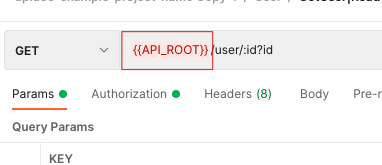apidoc2postman v1.1.1
apidoc2postman

This library uses the apidoc-core library.
How It Works
Parsing apiDoc inline comments in the source code, export a postman.json file which can be imported into the Postman App to create a new collection.
E.g.
/**
* @api {GET} /user/id Request User information
* @apiName GetUser
* @apiGroup User
* @apiPermission basic
*
* @apiParam {Number} id Users unique ID.
*
* @apiSuccess {String} firstname Firstname of the User.
* @apiSuccess {String} lastname Lastname of the User.
*/Installation
npm install apidoc2postman
Features
apidoc2postman takes full advantage of Postman environment variables for the following aspects
CLI usage
Usage: apidocPostman [options]
Options:
-f --file-filters <file-filters> RegEx-Filter to select files that should be parsed (multiple -f can be used). (default: )
-e, --exclude-filters <exclude-filters> RegEx-Filter to select files / dirs that should not be parsed (many -e can be used). (default: )
-i, --input <input> Input/source dirname. (default: )
-o, --output <output> Output dirname. (default: ./doc/)
-t, --template <template> Use template for output files. (default: /Users/ruby/codebase/ruby/apidoc2postman/template/)
-c, --config <config> Path to directory containing config file (apidoc.json). (default: ./)
-p, --private Include private APIs in output.
-v, --verbose Verbose debug output.
-d, --debug Show debug messages.
-c, --color Turn off log color.
--parse Parse only the files and return the data, no file creation.
--parse-filters <parse-filters> Optional user defined filters. Format name=filename (default: )
--parse-languages <parse-languages> Optional user defined languages. Format name=filename (default: )
--parse-parsers <parse-parsers> Optional user defined parsers. Format name=filename (default: )
--parse-workers <parse-workers> Optional user defined workers. Format name=filename (default: )
-s, --silent Turn all output off.
--simulate Execute but not write any file.
-m, --markdown [markdown] Turn off default markdown parser or set a file to a custom parser. (default: true)
-l, --line-ending <line-ending> Turn off autodetect line-ending. Allowed values: LF, CR, CRLF.
--encoding <encoding> Set the encoding of the source code. [utf8]. (default: utf8)
--sort, --sortby <sortby> Api sort by <name|verbs|title> (default: verbs)
--ef, --export-filename <export-filename> export postman filename (default: postman)
-h, --help output usage informationAPI URL
Default would use the base_url environment variable you can specify the base URL of your APIs.
If there is sampleUrl in apidoc.json or package.json/apidoc would replace it into file.
e.g.
{
"name": "apidoc-example-project-name",
"version": "0.3.0",
"description": "apidoc example project",
"title": "Custom apiDoc browser title",
"url" : "https://api.github.com/v1",
// setting url
"sampleUrl": "{{API_ROOT}}",
"template": {
"withCompare": true,
"withGenerator": true
}
}
Body
apidoc2postman will setup Postman to use application/json body format and will create a template body based on the apiBody.
E.g.
/**
* @apiBody {int} id operator id
* @apiBody {string} name operator name
* @apiBody {int[]} setting operator personal setting
*/will translate to the following template body
{
"id": 0,
"name": "string",
"setting": [0, 1]
}Body Parsing Type
😃 Data Type is case insensitive.
| Data Type | Parsing Value |
|---|---|
number | 0 |
int | 0 |
integer | 0 |
float | 0 |
bit | 0 |
boolean | false |
bool | false |
array | [0, 1] |
int[] | [0, 1] |
date | new Date().toISOString() |
datetime | new Date().toISOString() |
string | string |
string[] | ['string', 'string'] |
object | { key: 'value' } |
point | {Lat: 'value',Lng: 'value'} |
object[] | [{ key: 'value' },{ key: 'value' }] |
Example
apidoc2postman -i example/ -o doc/
Have a look at apiDoc for full functionality overview and capabilities of apiDoc.
Plugin Example
Windows user should use node prefix to use module.
Setting input folder by using -i or --input.
Setting export folder by using -o or --output.
node ./node_modules/apidoc2postman/bin/apidocPostman.js -i ./app -o ./exportSetting api sorting by using --sort or --sortby. (name|verbs|title)
node ./node_modules/apidoc2postman/bin/apidocPostman.js -i ./app -o ./export --sort nameSetting export file name by using --ef or --export-filename.
node ./node_modules/apidoc2postman/bin/apidocPostman.js -i ./app -o ./export --export-filename myCollectionBase Postman Environment setup
{
"base_url": "https://localhost:5050"
}